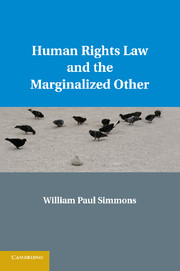Book contents
- Frontmatter
- Brief Contents
- Contents
- Preface
- Introduction
- Part I Deconstruction of Human Rights Law
- 1 Arendt, Little Rock, and the Cauterization of the Other
- 2 Democracy, Human Rights, and L’Affaire du Foulard
- Part II Phenomenology of the Saturated Other
- Part III Human Rights of the Marginalized Other
- Conclusion Working with the Marginalized Other to Deconstruct and Reinvigorate Human Rights Law
- Bibliography
- Index
1 - Arendt, Little Rock, and the Cauterization of the Other
from Part I - Deconstruction of Human Rights Law
Published online by Cambridge University Press: 07 October 2011
- Frontmatter
- Brief Contents
- Contents
- Preface
- Introduction
- Part I Deconstruction of Human Rights Law
- 1 Arendt, Little Rock, and the Cauterization of the Other
- 2 Democracy, Human Rights, and L’Affaire du Foulard
- Part II Phenomenology of the Saturated Other
- Part III Human Rights of the Marginalized Other
- Conclusion Working with the Marginalized Other to Deconstruct and Reinvigorate Human Rights Law
- Bibliography
- Index
Summary
The human rights of the Marginalized Other developed in this book owes a great deal to recent attempts to develop a theoretical concrete universalism by prominent proponents of discursive democracy such as the political theorists Hannah Arendt and Seyla Benhabib. However, it questions the extent to which these prominent concrete universalisms are able to shed artificial typologies that cauterize the Other. Whereas the present work argues for extraordinary measures to patiently listen to the voice of the Other, Arendt’s account of deliberative democracy urged the exclusion of the voiceless from the polis. Arendt also urged members of the polis to eschew such private emotions as pity and compassion for the marginalized while in the public realm and that they only cautiously take up solidarity with the marginalized Other. These forms of cauterization are most apparent in Arendt’s famous theory of judgment, especially as it is applied in her analysis of the Little Rock School Crisis in 1957.
Arendt’s theory of judgment is an exemplar of a concrete universalism and has been recently embraced by a number of political theorists. Whereas Arendt attempts to dismiss the banisters of thought and to develop a universalism based on concrete experience, her theory of judgment ultimately relies on artificial typologies that for the most part remain un-interrogated. I argue that this lack of questioning is directly related to her deliberate cauterization of the Other from political judgment. Without the voice of the Other, the rulings of an Arendtian judge are never seriously questioned. Arendtian judgment resembles groupthink, where like-minded judges make decisions that reinforce their privileged position. This chapter argues that Arendt’s reliance on her own theoretical typologies and the silencing of the Other explain her ill-fated essay on the Little Rock Central High School crisis in 1957 in which Arendt famously sided with many of the arguments of the segregationists. We may be tempted to label Arendt’s Little Rock essay as an anomaly by a normally sensitive writer, or representing a type of judgment that has been since discounted, but the problems inherent to Arendt’s analysis run through the very foundations of human rights law and are frequently seen in a number of other human rights cases, as we shall see in subsequent chapters.
- Type
- Chapter
- Information
- Human Rights Law and the Marginalized Other , pp. 19 - 43Publisher: Cambridge University PressPrint publication year: 2011
- 1
- Cited by



